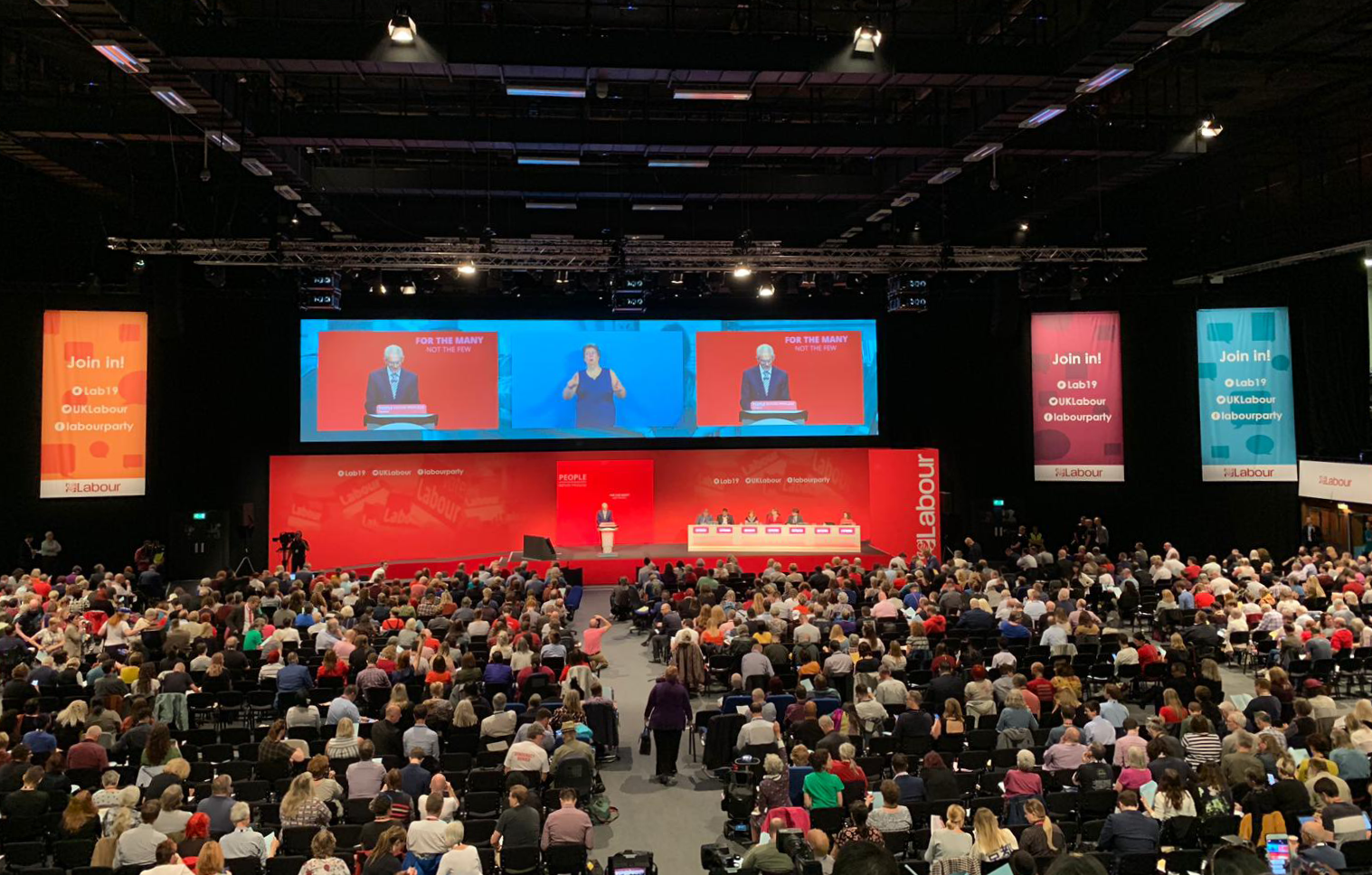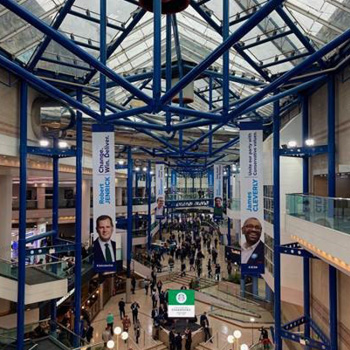A last-minute shot in the arm for an otherwise ailing Labour party

Sometimes Party Conferences go well. Sometimes they don’t.
From Saturday to Monday, Labour’s annual gathering in Brighton looked set to become the archetypal example of the latter, beset as it was, by conflict between Party members, the Leadership and the Trade Unions, a bitter row over Brexit, and a generally low mood.
The resignation of Corbyn’s Chief Policy Adviser, Andrew Fisher, on Saturday night – a man who was seen by many as the one remaining bridge between LOTO and the Shadow Cabinet, sent shockwaves through the Party. His departing lament about the lack “professionalism, competence and human decency” at the heart of the movement and apparent loss of confidence that the Labour Leader could succeed, raises serious questions about the long-term viability of the Corbyn project. It set a tone of defeatism that hung over the rest of the Conference.
It was very hard for anyone attending to see how Labour could turn around its current slump in the polls and go on to electoral victory. And let’s be clear, the slump is deep. Recent polls have put Labour in the low-twenties and up to fifteen points behind the Conservatives. In some polls, Labour are behind the Lib Dems.
But the past week has also served as a reminder of how quickly politics can change.
At 1030 on Tuesday morning, Baroness Hale delivered the Supreme Court’s ruling against the Government’s prorogation of Parliament. At once, the Conference mood music changed.
Let’s be clear, this could have been a further Conference nightmare for Labour. Westminster eclipsing Brighton. The Leader’s speech knocked both off schedule and down the order of the 10 o’clock news. The travelling media immediately shifting their attention. You could almost feel the pull of the train station.
However, it proved to be the game changing moment the Party badly needed. Immediately giving Labour an open goal and, it seemed, a week’s worth of penalty kicks.
And with the Conservative captain still away in New York, Corbyn lined up carefully, and, for once, he put the ball in the back of the net. He quickly addressed the Conference calling for the Prime Minister to consider his position.
The Leader’s speech was then hastily brought forward (conveniently bumping Tom Watson’s likely acrimonious platform speech out of its slot). The performance was classic Corbyn – reasserting a radical agenda and a politics “for people, not privilege”. The hall loved it. Whether anybody else did remains to be seen.
Thereafter the focus of political attention shifted rapidly to Westminster. The political impact of illegal prorogation and its fallout will be far more significant than Labour’s truncated trip to the seaside. But for a moment, it is worth considering what might be learned from the Conference before it was interrupted.
The main takeaway has to be that this was not the display of a Party either ready for, or serious about, winning an election, or one that believed it was on the cusp of power. And this represented a marked shift from the optimism, seriousness and energy seen just a year ago.
At its crux this issue appears to highlight the fundamental limitations of Corbyn’s leadership.
Even after four years in the job, Corbyn remains a political outsider. He is a fringe campaigner, driven by ideology, values and compassion, as he always has been. This has been central to his appeal and his success in reconnecting Labour with both its socialist purpose and the more radical elements of its base after years of drift to the centre.
But Corbyn is not someone who has ever been motivated by power or delivering the change he champions. Why else was he content to sit on the backbenches for 32 years before unexpectedly becoming Leader? And why else has he done so little to contain the more extreme elements of his own support base, so repellent to the majority of the electorate?
The challenge for Labour now is that there is a growing gulf between public opinion of Corbyn and that of his Party. At -76, Corbyn’s public disapproval ratings are lower than any Labour Leader since the 1970s. Yet the Labour Party delegates continue to offer him cult like support, as if he had already delivered them power.
The problem here appears to be that “Project Corbyn” was always more to do with achieving power in the party than winning power in the country. By this measure, the project has largely already achieved its objectives in terms of its grip over the Party’s various power bases. But, having tacked steadily away from the centre ground swing voters, Labour’s leadership appear to have lost sight of the bigger prize, despite being so close to a potential election.
Corbyn apparently lacks the ability or inclination to tailor his message to different audiences. Once again this year, Corbyn addressed a gathering of senior business leaders, and failed to mention business once. He did little in his Leader’s speech to broaden his appeal beyond the Hall.
Those behind the Corbyn project are consequently nervous to the point of paranoia about the future. This feeling largely revolves around the question of succession. Corbyn, 70, is widely thought to be ready to step aside. But those around him are clearly fearful both of their own futures and of what becomes of their project, once its chief icon is gone.
This subplot was omnipresent at Conference. On the platform and the fringe potential leadership contenders, Thornberry, Long-Bailey, Rayner, Starmer and Pidcock, all increasingly present themselves as leaders in waiting, and these key figures increasingly demonstrate a willingness to publicly differ from their Leader on key issues.
The Brexit policy debate, essentially a choice between Corbyn’s preferred option of Labour negotiating an improved Brexit deal and being a ‘neutral referee’ in any second referendum campaign, and an alternative, supported by many in the grassroots and the PLP, that the Party should come out unambiguously for the remain cause, highlighted just how deep division runs, even within the Leader’s core team. The result was almost too close to call, but went Corbyn’s way.
Leadership paranoia was seen most clearly in the brazen attempt by Corbyn’s Momentum allies, or more precisely “guardians”, to abolish Tom Watson’s deputy leadership position at the eve of Conference meeting of the Party’s National Executive Committee. Watson leads Labour’s informal grouping of moderate MPs and is perceived to be the biggest remaining threat to the ongoing hold of the left once Corbyn is gone. While the proposal to abolish the Deputy Leader was ultimately defeated, the win for Team Corbyn was the NEC’s decision to grant itself the power to approve an Acting Leader.
For now, in truth, there is no real internal threat to Corbyn’s grip on his Party. He looks set to lead Labour into the next election. The main threats remain the potential defection of Labour MPs to an alternative cross-party initiative leaving Corbyn impotent (something Watson’s treatment in Brighton may make more likely), or defeat at the ballot box.
But as Harold Wilson once famously noted, a week is a long time in politics. An election campaign will be even longer. And in the current climate, the appeal of a principled, compassionate and radical leader could tempt many voters. That is certainly the hope of the leadership, who believe that Corbyn is still capable of delivering a turn-around in approval ratings similar to the one he achieved in 2017.
It is therefore too soon to write off the leadership, or Labour, however weak they may appear. As we move closer to a General Election, this last week in Brighton does constitute a lost battle, but Corbyn may yet emerge to win the war.
Tim Snowball, Head of Public Affairs
Find Out More
-
Corporate Affairs Trends for 2025
December 17, 2024


